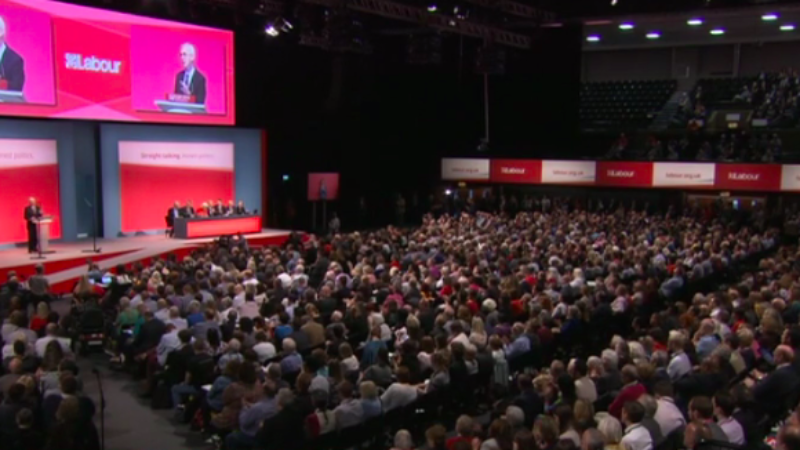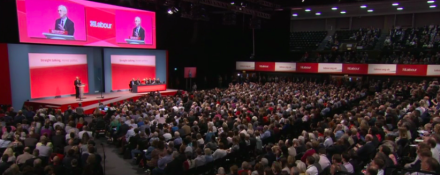

Long before Momentum was created, the organising hub for the hard left was the venerable Campaign for Labour Party Democracy (CLPD).
Created in the 1970s, CLPD was at the core of organising the Bennite attempt to take over Labour, keeping detailed files on the politics of every Constituency Labour Party (CLP) and pumping out a flow of recommendations for candidates to vote for in internal elections, model policy resolutions and rule change proposals.
Given the name of the organisation, rule changes have always been a big priority. CLPD’s starting premise was that activists were radical but were being held back by the conservatism of MPs, the leadership, party staff and trade union leaders, so if you could change the internal democratic structures of the party to empower activists, the politics of the party would switch leftwards.
Some of the key players still drafting rule changes such as NEC Member Pete Willsman and Momentum organiser Jon Lansman have been playing this role for nearly 40 years.
Many of their demands have been consistently argued for: a greater say over the manifesto for annual conference, easier deselection of sitting MPs by local members.
On other issues they have showed a talent for pragmatic flexibility. Having opposed One Member One Vote (OMOV) elections vigorously when they thought that the mass of members were not as leftwing as activists who attended CLP meetings, they have more recently enthusiastically supported OMOV because they now believe the opposite to be the case.
Their latest set of rule change proposals landed in CLP Secretaries’ email boxes last week, and if you attend CLP meetings you may see one of these gems being tabled at a meeting between now and the deadline of 24 June.
CLPs have to choose between submitting a rule change or skipping this and submitting a “contemporary motion” in September.
In the past twenty years CLPD’s proposals looked like grumbling from the fringe.
Now they are the constitutional reform package being promoted by the faction that controls Labour’s leadership, drafted by some of Jeremy Corbyn’s oldest political allies (he and Willsman were both NUPE officials together in the 1970s).
They either represent a blueprint for cementing the Hard Left takeover of Labour, or on a more pessimistic reading, an attempt to leave behind structures where the left has a more powerful voice in policy-making and candidate selection, and a chance to run in every leadership election and keep the debate left-influenced if their national grip on power in the party proves to be transitory.
The trick with all CLPD rule changes is to understand that while they are presented using language about democracy and accountability in order to attract activist votes, the motive behind them is a straightforward one of maximising the partisan factional strength of the left inside the party structures.
Here’s what they are proposing should be submitted for debate at Annual Conference this year (the document with the exact proposed changes is here):
“Clarify the rules for electing Leader to avoid the Party being involved in legal battles” (p1 of the document)
This change would mean an incumbent leader would automatically be on the ballot paper even if they couldn’t secure the 20% of MPs and MEPs required of a challenger to launch a challenge. This is basically incumbency protection for Jeremy Corbyn (from an organisation that wants to remove protection for incumbent MPs), and could lead to the ridiculous situation where a leader who didn’t have the confidence of 81% of the MPs they have to work with could still be re-elected.
“Ensuring a democratic choice in Labour Leadership elections – when there is a vacancy” (p2)
This reduces the nomination threshold in vacant leadership and deputy leadership elections from 15% of MPs and MEPs to just 5%. It just happens there are about 5% of Labour MPs and MEPs who would always nominate a Hard Left candidate. This change is because the left realise that Corbyn’s victory means they can’t argue again that more moderate MPs should help nominate a Hard Left candidate in order to “broaden the debate” knowing that they can’t win. It just happens that John McDonnell is also a lot less personally popular with MPs than Corbyn, and if Jeremy was to step down due to age or having got fed up with the job, McDonnell will only get on the ballot if the threshold is reduced. This further reduces the standing of the PLP and throws the idea that a leader should have the confidence of the most senior and experienced politicians in the party out of the window.
“CLPs to have the right to submit a rule change AND a contemporary motion” (p3)
This is indicative of a lack of confidence in CLPD about how many CLPs they organisationally control. They want to be able to use their core compliant CLPs twice during the process, to send in a rule change and a policy motion.
“Policy Reports: end the choice between all or nothing Allow conference to vote in parts” (p4)
This change would allow detailed line by line reference back of parts of policy reports from the National Policy Forum (NPF) at Annual Conference. It is designed to undermine the consensual, deliberative and evidence-based NPF system introduced in the 1990s and allow a return to old-style confrontational debates and policy votes at conference. Annual Conference would be a series of policy fights between factions, generating a week of headlines about infighting, rather than a showcase for Labour to use to promote itself to the electorate.
“Abolish the obsolete one year’s delay re rule changes from CLPs” (p5)
Currently CLPs table rule changes and the NEC gets to consider them for a year and develop a response before they are voted on. This change would enable Momentum to try to bounce controversial rule changes through conference during the short period the left expect to be in control.
“Remove the arbitrary criterion of ‘contemporary’ in relation to annual conference motions” (p6)
Currently CLPs are supposed to submit policy to the NPF for consideration and motions to conference can only be about matters that happen in the six weeks after the NPF reports are written. This change basically destroys the NPF system by enabling CLPs to send motions straight to conference on anything, so we can have divisive public debates on topics like Trident debate every single year, further returning conference to being a week long bad news story for the party.
“Full involvement by party branches and branches of affiliated organisations in the selection of Westminster candidates” (p7)
My suspicion is that this seemingly innocuous change is designed to create a filtering exercise where super-activists who are more likely to turn up to every stage of a multiple stage selection process weed out ideologically impure candidates at branch level to stop them getting long-listed or short-listed and voted on by the mass of members who only come to the final hustings and selection vote.
“A two term limit for elected Mayors” (p8)
This is a straight forward attempt at gerrymandering. They want to use the US concept of term limits, which have no place in British political culture, to sack long-term very popular incumbent elected Mayors like Sir Robin Wales in Newham and Jules Pipe in Hackney. Both have transformed previously chaotic councils and consistently been reselected overwhelmingly in trigger ballots and reelected by landslides, but the Hard Left obviously perceives them to be ideologically incorrect in some way, or wants a way back into control of once extreme councils, so is gratuitously and undemocratically trying to block them.
“A new Local Government Committee structure (instead of the existing Local Campaign Forum)”(p9)
This is an attempt to reintroduce backseat driving of councillors, where a local party committee usually comprising people too idle or unqualified to actually serve as councillors themselves tries to dictate policy to the Labour councillors who have been democratically elected by local people. It removes the focus on organising election campaigning currently embedded in the Local Campaign Forum structures and replaces it with something inward looking and all about policy control inside the party rather than winning elections.
“A democratic Young Labour” (p10)
Labour has lost 3 youth sections to entryism. The Labour League of Youth was taken over by the far left in the 1930s. The Young Socialists were taken over by the predecessors of the Workers’ Revolutionary Party in the 1960s. The Labour Party Young Socialists were taken over by Militant in the 1970s. Young Labour’s status in the party is safeguarded against such a takeover by measures including the party having the final say over its rulebook. This change is designed to enable Young Labour to be taken over by Trotskyists and destroyed like its predecessors.
Changes to make it easier to deselect MPs are only missing because they were rejected last year and so fall foul of a three year ban on debating the same rule change repeatedly.
No thanks, comrades. You can keep your 1970s model in the dustbin of history where it belongs (to quote Trotsky).
Luke Akehurst is secretary of Labour First




More from LabourList
Almost half of Labour members oppose plans to restrict jury trials, poll finds
‘How Labour can finally fix Britain’s 5G problem’
‘The University of the Air – celebrating 60 years of Harold Wilson and Jennie Lee’s vision’